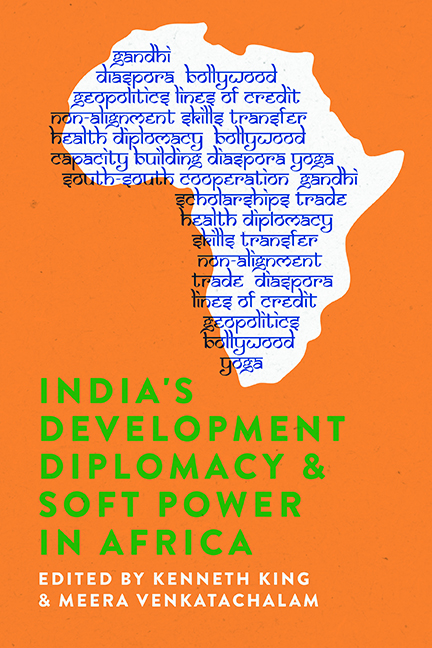Book contents
- Frontmatter
- Contents
- Notes on Contributors
- Acknowledgements
- List of Abbreviations
- Glossary
- Introduction: India–Africa Now: Changing Imaginaries and Knowledge Paradigms
- Part 1 The Geopolitical Imaginary and Soft Power
- Part 2 The Indian Political Right and the Reconfiguration of Soft Power in Africa
- Part 3 Capacity Building: Shifting Modalities and New Knowledgescapes
- Part 4 Skilling, Knowledge Transfer and Indo-African Interactions
- Conclusion: Reflections on India–Africa Studies, Development Cooperation and Soft Power
- Index
1 - India's Soft Power in East Africa: Opportunities and Challenges
Published online by Cambridge University Press: 26 May 2022
- Frontmatter
- Contents
- Notes on Contributors
- Acknowledgements
- List of Abbreviations
- Glossary
- Introduction: India–Africa Now: Changing Imaginaries and Knowledge Paradigms
- Part 1 The Geopolitical Imaginary and Soft Power
- Part 2 The Indian Political Right and the Reconfiguration of Soft Power in Africa
- Part 3 Capacity Building: Shifting Modalities and New Knowledgescapes
- Part 4 Skilling, Knowledge Transfer and Indo-African Interactions
- Conclusion: Reflections on India–Africa Studies, Development Cooperation and Soft Power
- Index
Summary
Introduction
Ever since Joseph Nye introduced the idea of soft power in academia in the early 1990s, it has attracted keen interest especially in the emerging economies. Perhaps aware of their hard power deficit, soft power has been embraced as an important element of foreign policy for countries which are looking to charm the world. India has been no exception. Sitting as the world's fifth largest economy, New Delhi is projecting an image of prosperity especially in the developing world. It is not surprising that the African Development Bank (AfDB) president, Akwinumi Adesina, has described India as a developing beacon for the rest of the world (Bhatia 2017). Indeed, in many parts of Africa, India is regarded as a donor country.
This chapter seeks to understand New Delhi's soft power potential in the East African region at a time when India is engaging Africa with rejuvenated rigour. The East African countries referred to here are those forming the East African Community (EAC): Tanzania, Kenya, Uganda, Rwanda, Burundi and South Sudan. The chapter is framed to respond to key questions about India's soft power in East Africa. First, I examine New Delhi's soft power potential. Second, I interrogate the extent to which soft power and related attributes are shaping the relations between India and the East African countries by focusing on the soft aspects of the relationship. Third, I identify and discuss some of the challenges India is facing in its soft power projection in East Africa.
India's soft power project
Nye defined soft power as the power of attraction, stating that ‘a country may obtain the outcomes it wants in world politics because other countries – admiring its values, emulating its example, aspiring to its level of prosperity and openness – want to follow’ (Nye 2004: 5). Nye went on to identify a country's culture, political values and foreign policy as the main soft power resources. Unlike hard power, which coerces, soft power attracts. This definition has been contested, mostly due to the tendency by states to combine both soft and hard power mechanisms to pursue their national interest. In this chapter, while we are guided by Nye's definition, we will also consider other forms of hard power that we believe partly inform India's ability to attract in the East African region.
- Type
- Chapter
- Information
- India's Development Diplomacy and Soft Power in Africa , pp. 27 - 40Publisher: Boydell & BrewerPrint publication year: 2021



